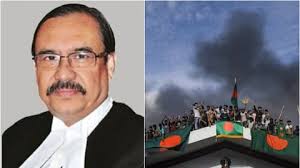Title: The Resignation of Bangladesh’s Chief Justice Amidst New Student Protests: A Pivotal Moment in the Nation’s Judiciary
Introduction
The resignation of Bangladesh’s Chief Justice in the wake of student protests marks a significant and complex chapter in the nation’s judicial and political history. This event reflects the intricate interplay between judiciary independence, political pressure, and civic unrest, highlighting broader issues concerning the rule of law and democratic governance in Bangladesh. The Chief Justice’s decision to resign amidst rising tensions is a critical moment that underscores the challenges facing the judiciary in maintaining its independence in a volatile political landscape.
Table of Contents
Background: The Role of the Chief Justice in Bangladesh

The Chief Justice of Bangladesh holds a paramount position within the country’s judiciary, serving as the head of the Supreme Court and the ultimate arbiter of constitutional matters. The role is crucial in ensuring the separation of powers, upholding the rule of law, and safeguarding citizens’ rights against potential governmental overreach. However, the judiciary in Bangladesh has often found itself at the crossroads of political influence and autonomy, with several instances of judges facing pressure from political entities.
The Context of the Student Protests
The recent wave of student protests that precipitated the Chief Justice’s resignation is rooted in a broader context of dissatisfaction with the government’s handling of various national issues, including corruption, law enforcement, and justice delivery. Student movements in Bangladesh have historically played a crucial role in political change, most notably during the 1952 Language Movement and the 1971 Liberation War. The current protests, however, were sparked by concerns over a specific court ruling and perceived judicial biases, raising alarms about the integrity of the judiciary.
The Catalysts: Judicial Controversy and Political Pressure
The Chief Justice’s decision to resign did not occur in a vacuum. It followed months of mounting tension between the judiciary and the executive branch. A controversial ruling, which many believed was influenced by political considerations, led to widespread criticism and disillusionment among the public, particularly students who viewed the decision as a betrayal of justice. The government’s alleged attempts to influence judicial outcomes further exacerbated the situation, leading to calls for greater transparency and accountability within the judiciary.
Political pressure on the judiciary is not a new phenomenon in Bangladesh. The nation’s history is replete with instances where the judiciary has come under fire from political quarters, leading to a delicate balancing act for those in judicial authority. The Chief Justice’s resignation under such circumstances suggests a tipping point where the pressures became untenable, forcing a retreat rather than a confrontation with the political establishment.
The Role of Students in the Protests
Students, historically the vanguard of social and political movements in Bangladesh, once again took center stage in the protests. Their mobilization was swift and widespread, fueled by social media and a shared sense of injustice. The protests were not merely about the immediate judicial controversy but also reflected broader frustrations with systemic corruption, lack of accountability, and the erosion of democratic institutions.
The students’ demands for the Chief Justice’s resignation symbolized a broader call for reform within the judiciary and government. Their protests gained traction quickly, resonating with other segments of society who were disillusioned with the current state of affairs. The movement’s rapid growth and its ability to galvanize public opinion played a critical role in bringing the issue to a head, leaving the Chief Justice with little choice but to step down.
Implications for Judicial Independence
The resignation of the Chief Justice amidst these protests raises serious questions about the state of judicial independence in Bangladesh. While the resignation may have temporarily quelled the unrest, it also sets a concerning precedent where judicial figures may be forced to resign under public and political pressure. This could undermine the judiciary’s ability to function as an independent and impartial arbiter of justice, free from external influences.
Moreover, this event may embolden political actors to exert further influence on the judiciary, knowing that public pressure can lead to the removal of inconvenient judicial figures. The judiciary’s credibility and public trust, already fragile, could be further eroded if the perception persists that judicial decisions are subject to political or popular whims rather than the rule of law.
The Broader Impact on Governance
The resignation also has broader implications for governance in Bangladesh. It highlights the challenges faced by democratic institutions in maintaining their autonomy and effectiveness in a polarized and politically charged environment. The intersection of judiciary, politics, and civic activism in this instance underscores the complexities of governance in a developing democracy like Bangladesh, where institutions are still evolving and are often subject to competing pressures.
In the aftermath of the resignation, there is a need for reflection and reform to ensure that the judiciary can operate independently and with integrity. This includes addressing the root causes of the protests, such as concerns over corruption, accountability, and the impartiality of judicial proceedings. It also requires a commitment from all branches of government to uphold the principles of separation of powers and the rule of law, essential for the health of any democracy.
Conclusion
The resignation of Bangladesh’s Chief Justice amidst student protests is a watershed moment for the nation’s judiciary and governance. It reflects deep-seated issues within the political and judicial systems and highlights the powerful role that civic movements, particularly student-led protests, can play in shaping national events. While the immediate crisis may have been resolved with the Chief Justice’s resignation, the underlying issues of judicial independence, political influence, and governance remain critical challenges that Bangladesh must address. Moving forward, the country’s leaders and institutions must work together to strengthen democratic principles and ensure that the judiciary can operate independently, upholding justice and the rule of law for all citizens.









